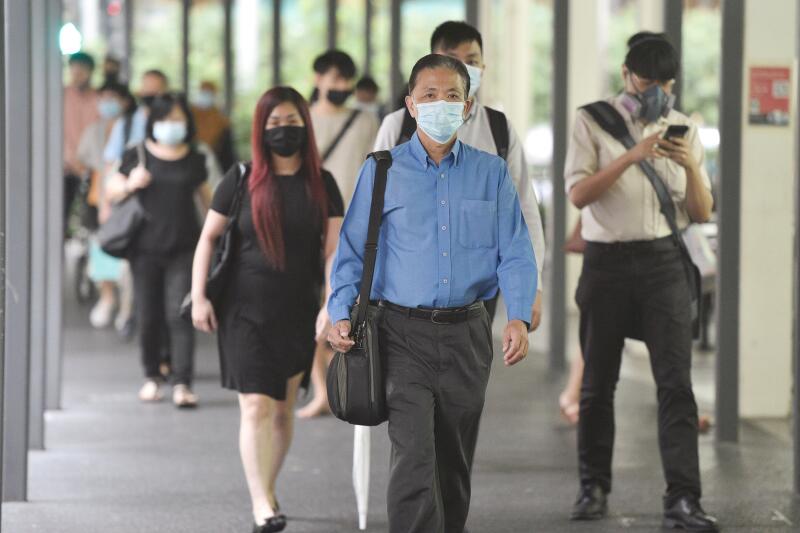Do away with bias against mature workers, Tharman tells employers in Singapore
Sign up now: Get ST's newsletters delivered to your inbox

Mr Tharman Shanmugaratnam said the issues faced by mature workers are not limited to a mismatch in skills.
ST PHOTO: DESMOND WEE
Follow topic:
SINGAPORE - Employers in Singapore still harbour a bias against mature workers, said Senior Minister Tharman Shanmugaratnam on Tuesday (Jan 12).
He called on employers to "take the high road", and make use of government schemes to hire and train such workers.
This will benefit both workers and firms given the tight labour market, said Mr Tharman at a forum on jobs and skills at the Singapore Perspectives conference, organised by the Institute of Policy Studies.
"We're not going to loosen up our foreign worker policy - quite the opposite," he said. "So, make the most of our Singapore workforce."
On the panel with Mr Tharman were American economics professor Tyler Cowen and OCBC Bank chief economist Selena Ling. The discussion was moderated by Lee Kuan Yew School of Public Policy Professor Danny Quah.
Responding to a question on the challenges that younger and older job-seekers face when entering the workforce, Mr Tharman said the issues faced by mature workers are not limited to a mismatch in skills.
Employers also should be willing to hire, reskill and upskill such workers, who already have significant skills.
"You'll never get a perfect match of skills, except for a certain, very few, specialised jobs," the minister added. "In general, you hire someone, you train them up, and they have to adapt. It can be done."
Singapore has people with experience, a willingness to work hard and a willingness to learn, said Mr Tharman, who is also Coordinating Minister for Social Policies.
He added that this is why the Government has slanted its incentives - such as the Jobs Growth Incentive (JGI) - towards mature workers.
Under the JGI, firms that raise their headcount of local workers receive a subsidy for up to 25 per cent of their salaries for one year, subject to a cap. The co-payment by the Government goes up to 50 per cent for those that hire workers aged 40 and above.
But such schemes require some change of attitude on the part of employers, as well as "some new heart towards our mature workers", he noted.
Ms Ling said older workers will benefit from surrounding themselves with younger colleagues and keeping abreast of the latest developments.
"I think being on your toes all the time, trying to learn what's forefront in terms of the winds of change in your industry helps," she added.
One piece of advice she has for mid-career hires is to think about how skills acquired in their current jobs can be applied to their new career. "Being able to articulate how you would actually bring value-add to the job - that's something school doesn't teach you."
For young job-seekers, Ms Ling stressed the importance of internships and real life experience to help them get a sense of what employers are looking for.
Mr Tharman noted that certain cohorts may enter the workforce at the wrong time - such as during a financial crisis - but have managed to bounce back.
The important thing is to have a system in which everyone keeps adapting and learning, he said. "Don't expect a job that is exactly what you thought you were going to do when you were studying; get into the market and learn as much as you can."
The speakers also briefly addressed the topic of the gig economy, which young people in Singapore and elsewhere are gravitating towards.
One potential pitfall is that those in the gig economy may not have very good career ladders, Professor Cowen pointed out.
"Who is your mentor? Who is training you on the job?" Prof Cowen asked. "My biggest worry about temporary labour is that our imagined vision of where those jobs lead is too short term.
"I get that the gig economy is necessary. We need many of those jobs. But I don't think it's actually, by and large, the answer to our labour market problem."
The panellists also spoke on entrepreneurship, and whether Singapore's recipe for talent will ever produce the next Elon Musk or Mark Zuckerberg.
For Prof Cowen, this outcome seems unlikely. "(Elon Musk) is not your style," he said. "I think Singaporean society is in some ways much too conformist to be the land of Mark Zuckerberg, much less Elon Musk."
Instead, Singapore's strength lies in its people's ability to work in teams and boost each other's ability, with plenty of top talent going into government, he said.
"The core Singaporean startup is the Singaporean state, which has the most talented, most cohesive civil service in the world," Prof Cowen added. "No one else has created anything like that. It was a phenomenal and ongoing act of entrepreneurship. If you think of it in those terms, you will realise there is no entrepreneurial deficit in Singapore right now."
Responding to Prof Cowen, Mr Tharman voiced his belief that there is scope for more individual exceptionalism in Singapore.
"That individual exceptionalism is needed for the future, to complement that system exceptionalism that we have, that system entrepreneurship that Singapore is well known for," he said.

